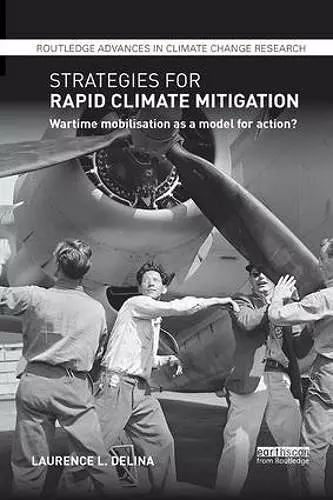Strategies for Rapid Climate Mitigation
Wartime mobilisation as a model for action?
Format:Paperback
Publisher:Taylor & Francis Inc
Published:3rd Jan '18
Currently unavailable, our supplier has not provided us a restock date
This paperback is available in another edition too:
- Hardback£150.00(9781138646230)

To keep the global average temperature from rising further than 2°C, emissions must peak soon and then fall steeply.This book examines how such rapid mitigation can proceed – in the scale and speed required for effective climate action – using an analogy provided by the mobilisation for a war that encompassed nations, the Second World War.
Strategies for Rapid Climate Mitigation examines the wartime-climate analogy by drawing lessons from wartime mobilisations to develop contingency plans for a scenario where governments implement stringent mitigation programs as an ‘insurance policy’ where we pay for future benefits. Readers are provided a picture of how these programs could look, how they would work, what could trigger them, and the challenges in execution. The book analyses in detail one plausible approach to a crucial issue – an approach built upon knowledge of climate science and on proven and demonstrated mitigation measures. The book is meshed with a social and political analysis that draws upon narratives of mobilisations during the war to meet a transnational threat, while also addressing the shortcomings of the analogy and its strategies.
The book will be of great interest to scholars, students, and practitioners of public policy, climate policy, energy policy, international relations, and strategic studies.
"The most fascinating part of this book is its close look at how wartime mobilization of our industrial sector might actually happen. People have been talking about it for years, but Laurence Delina has actually done the work to figure it out."– Bill McKibben, founder of 350.org, USA
"Strategies for Rapid Climate Mitigation is an important and timely contribution to the urgent debate about the actions required to drive swift and equitable decarbonisation of the global economy. The detailed and thoughtful discussion of key legislative, regulatory, financial, and labour market policies for mobilizing the resources and capabilities required to achieve emergency speed emission reductions is particularly valuable."– John Wiseman, Deputy Director, Melbourne Sustainable Society Institute, University of Melbourne, Australia
"In our age of catastrophe and neoliberal defeatism, this book is a beacon of hope. Laurence Delina uses his fierce intellect and bold vision to demonstrate that a global emergency mobilization against climate change, with states as central actors, is a viable strategy—indeed it may be the only one left. A must read." – Margaret Klein-Salamon, founder and director of The Climate Mobilization, USA
"The world needs to transition to clean, renewable energy as quickly as possible to reduce the health and climate damage inflicted by the combustion age. This excellent new book examines resources and efforts needed for such a transformation, using wartime mobilization as an example. I recommend it highly for students and the public."– Mark Z. Jacobson, Stanford University, USA
"Despite frequent calls for rapid transitions to a lower carbon economy, few people have sought systematically to build on the lessons of the past to sketch out potential scenarios for the future. The Gendanken(thought) experiment that lies at the heart of this book forces us to engage with historical lessons and face up to uncomfortable truths about the role of the state, finance and labour in enabling and accelerating an energy transition to a world in which climate change is more effectively addressed. It is original, provocative and deserves to be widely read."– Peter Newell, University of Sussex, UK. Editor of ‘The Politics of Green Transformations’ (Routledge 2015).
"Delina asks how human societies can tackle the herculean task of recasting energy systems to meet climate change. He successfully sketches the many moving parts involved in a complex socio-technical transition. From sustainable energy technologies to public policies, and from vested interests to systemic inertia, transition looks daunting. In answer, Delina argues for reviving government as a leading agent of change, rather than relying only on the market. Using wartime mobilization history, he shows both the possibilities and limitations of government action. He calls for the creation of new, powerful institutions to help plan and superintend the widespread, rapid take-up of sustainable energy technologies. He also calls for checks on executive power, reflecting modern democratic norms. The book empowers us to imagine how we might arrive at our climate-safe future." – Alastair Iles, University of California Berkeley, USA
"If publics come to demand climate action, as well they might as extreme weather intensifies and surprises multiply, this book offers a model, historically grounded yet applied to contemporary, even future trends. Delina doesn’t just look back for "lessons from history" but projects forward, imagining the possibility of fundamentally challenging the self-destructive, endlessly expansionist order."– Thomas Princen, University of Michigan Ann Arbor, USA
"The most fascinating part of this book is its close look at how wartime mobilization of our industrial sector might actually happen. People have been talking about it for years, but Laurence Delina has actually done the work to figure it out."– Bill McKibben, founder of 350.org, USA
ISBN: 9780815364542
Dimensions: unknown
Weight: 380g
208 pages